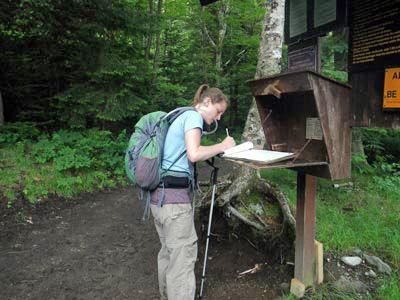Developing an Adirondack Park Trail Register Database to Support Recreation Management and Community Planning

Recreation is an important economic driver and landscape attraction in the Adirondack Park of New York. Despite the significance of recreation, very little information exists on recreation use across the Adirondack landscape's expansive system of trails and recreational assets. The New York State Department of Environmental Conservation (NYSDEC) maintains a system of more than 250 official trail registers, used primarily for search and rescue, which contain a wealth of data describing when, where, how, and by whom the trail network is used. Trail registers are a direct and voluntary mechanism for monitoring recreation use, with an estimated 95% compliance rate across the Adirondack Park.
NSRC researchers compiled over 8000 sign-in sheets from 212 trail registers into the Adirondack Park Trail Register Database (ADK-TReD). Researchers recorded all entries indicating total users in each group and their dates and length of stay. With these data, NSRC researchers conservatively estimated over 560,000 user days on Adirondack trails in 2012. By sampling the origins and destination of trail users, researchers can construct detailed profiles of recreationists for research and decision-making purposes. All data were spatially referenced in a geographic information system (GIS) to enable mapping of recreation use.
The information on recreational use and visitor profiles within ADK-TReD has broad applicability in research, and can also be used to support recreation management, community planning, and tourism marketing, and to identify opportunities for economic development or stewardship. As a major recreation hub of the Northern Forest, the Adirondack Park can serve as a model for understanding links between natural resources, recreation, and sustainable landscapes.
